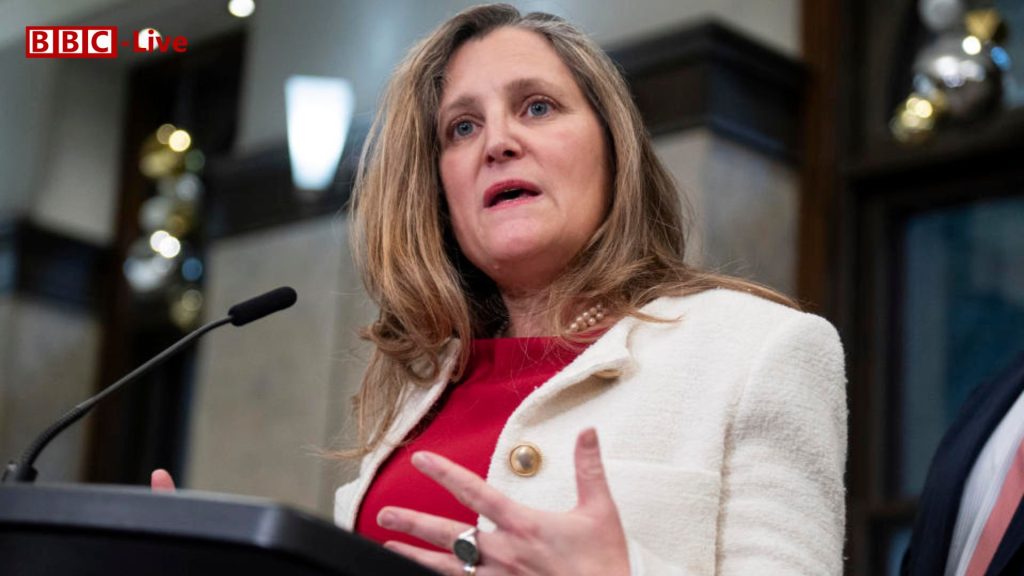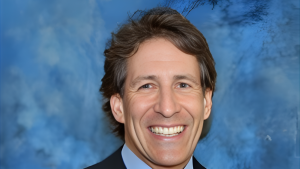
Canada’s deputy PM Chrystia Freeland resigns
The Surprise Resignation
Chrystia Freeland, Canada’s Deputy Prime Minister, has resigned. Her departure comes amid rising tensions with Prime Minister Justin Trudeau. Freeland is also the country’s Minister of Finance. She stepped down just hours before announcing the government’s economic plan. This move highlights significant divisions within the Liberal government. Many are now questioning Trudeau’s leadership and his political future.
Concerns Over Trade and Tariffs
Freeland’s resignation brings serious concerns to light. In her resignation letter, she shared her worries about the challenges Canada faces. These challenges stem from former President Donald Trump’s “America First” policy. Trump is threatening to impose a 25% tariff on Canadian goods and services. Freeland believes Canada needs to adopt a stronger stance against U.S. economic nationalism. She feels Trudeau’s government has not fully recognized this need.
Freeland warned about the upcoming “tariff war.” She highlighted the importance of maintaining Canada’s economic stability. She stressed the need to avoid “costly political gimmicks” that could harm the economy. Her letter reflects her deep commitment to protecting Canada’s interests.
Increasing Strain in U.S.-Canada Relations
Freeland’s resignation occurs during a time of heightened tension between Canada and the U.S. The relationship has become strained. Trump’s administration has suggested potential tariffs on Canadian imports. These tariffs, part of his broader protectionist policies, threaten to destabilize Canada’s economy. Freeland’s departure raises critical questions. What will Canada’s strategy be in dealing with the Trump administration?
Internal Conflicts Within the Trudeau Government
Freeland’s resignation also reveals political turmoil within Trudeau’s government. Sources indicate that Freeland and Trudeau have disagreed over economic policy proposals. They clashed over ideas that could lead to overspending or miss set fiscal targets. While Freeland focused on economic stability, Trudeau’s government considered temporary tax breaks and spending measures to gain voter support. Freeland opposed these measures due to their potential long-term fiscal impact.
In her letter, Freeland revealed an offer from Trudeau for a different cabinet role. This offer came just days before her resignation. Freeland declined it, as it meant stepping down as Finance Minister. Instead, Trudeau wanted to appoint Mark Carney to the role. Carney, former governor of both the Bank of England and the Bank of Canada, is highly respected. However, Freeland’s refusal to accept this change added to the tension between her and Trudeau.
Freeland’s Role in the Government and Her Legacy
Chrystia Freeland has been a key figure in Trudeau’s government. She has played a major role in handling Canada’s economic relations, particularly with the U.S. Freeland was instrumental in renegotiating the North American Free Trade Agreement (NAFTA). During Trump’s first term, she secured a trade deal that ensured Canada retained access to the U.S. market despite protectionist measures.
However, as Trump’s rhetoric has intensified, Freeland has found herself increasingly at odds with Trudeau. She believes the government needs to prepare and respond effectively to threats from the U.S. economy.
Trudeau’s Political Challenges
Freeland’s resignation comes at a challenging time for Prime Minister Trudeau. His popularity has been declining. Just weeks before Freeland stepped down, backbench Liberal MPs called for Trudeau’s resignation. They feared a significant electoral defeat in the upcoming federal elections. Freeland’s departure, as one of Trudeau’s closest allies, increases uncertainty around his leadership.
Political dynamics are further complicated by an important by-election. The seat for Cloverdale-Langley City in British Columbia will be contested soon. This by-election will serve as a crucial test for the government’s standing among voters. Analysts suggest that opposition candidates might outperform Trudeau’s Liberals given the current climate.
What’s Next for Freeland?
Despite stepping down from her cabinet position, Freeland remains a Liberal Member of Parliament (MP). She plans to run for re-election in the next federal election. In her resignation letter, she emphasized that Canada’s response to U.S. economic threats would define the country for many years, perhaps decades. While she will not lead the economic team, Freeland aims to advocate for policies that foster economic resilience.
As she leaves her cabinet role, the future of Canada’s economic strategy now rests mainly with Trudeau and his remaining cabinet members. Freeland’s resignation highlights broader challenges that Trudeau faces, including unity within the Liberal Party as they approach an important election year.
A Critical Junction for Canada
Freeland’s unexpected resignation marks a pivotal moment in Canadian politics. Trump’s economic nationalism poses a real threat to trade relations in North America. Canada’s political leadership now faces immense pressure. They must craft a viable strategy that not only protects Canadian economic interests but also unifies the country amidst external pressures.
The coming days and weeks will be vital. Trudeau will need




